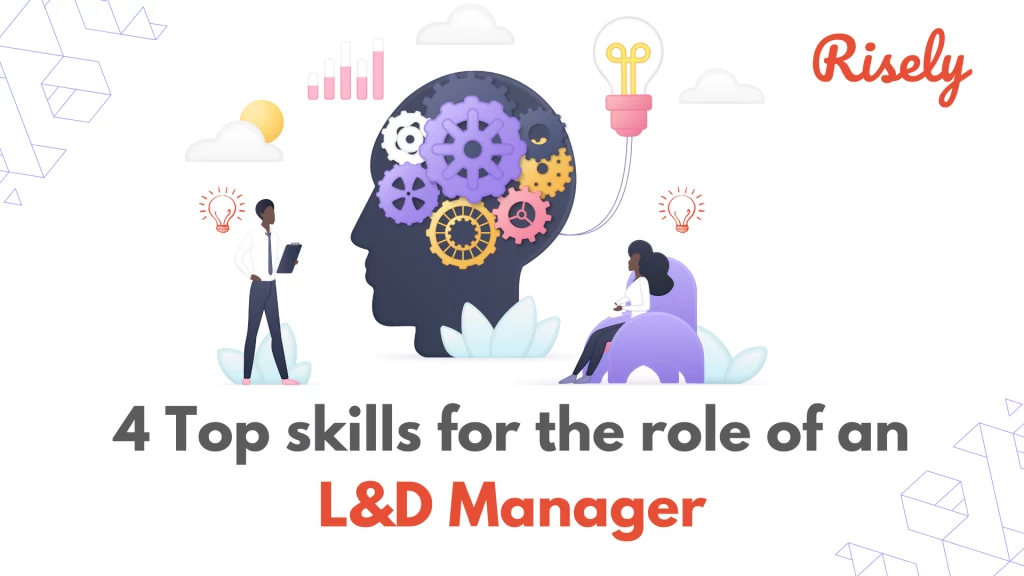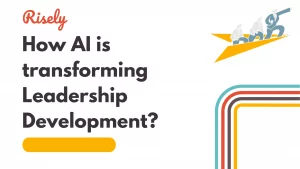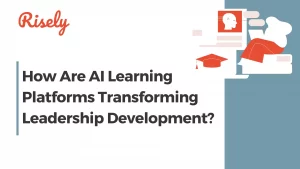4 Top skills for the role of an L&D Manager
Learning and development are crucial for our lives for obvious reasons. We begin learning from the day we are born. And later on, some of us only make a career in this field. Being a professional or manager in learning and developing an exciting role comes with responsibilities and requirements. As businesses evolve, L&D managers are crucial in designing training programs, evaluating their effectiveness, and identifying talent development opportunities. Through this blog, I will help you get a closer look at who an L&D manager is and what their crucial roles and responsibilities are. I will also help you understand the demand and necessity of L&D managers in today’s corporate world and the skills that you need to become a successful L&D manager.Who is a L&D Manager?
Learning and development are pivotal in driving organizational growth, enhancing employee skills, and fostering a culture of continuous improvement. It ensures that employees are equipped to meet evolving job demands, contributing to the overall success and sustainability of the organization. Nurturing a workforce through learning and development is vital for staying ahead in the modern business landscape. In charge of employee training and development, L&D managers prioritize skill enhancement and professional growth. Central to an organization’s learning culture, they support learning initiatives and workforce development. Their role is indispensable in shaping the workforce’s professional skills. Additionally, staying up-to-date with industry trends, they incorporate best practices into training programs. Read more about the top L&D trends in 2024!Why are Learning and development Managers indispensable?
- They play a crucial role in upskilling and reskilling the workforce, leading to improved employee engagement and retention.
- L&D Managers are vital in bridging the skills gap between current and future workforce needs.
- They drive a culture of continuous learning, ensuring the organization remains competitive and agile.
- L&D Managers contribute to the organization’s ability to respond to market dynamics by nurturing a talent pool of adaptable professionals.
Other Interesting Reads
The Roles and Responsibilities of a L&D Manager
As a Learning and Development (L&D) manager, one plays a pivotal role in fostering a culture of continuous learning and growth. This multifaceted role encompasses various responsibilities to enhance employee skills, knowledge, and performance. Here are several key aspects of an L&D manager’s roles and responsibilities: Training Needs Analysis: An effective manager conducts various assessments to pinpoint areas where training can impact most. For instance, in a customer service-oriented organization experiencing a rise in customer complaints, the manager might identify communication skills as a key area for improvement. Through surveys, performance reviews, and observation, they gather data to understand specific skill gaps and design training programs to enhance communication techniques for customer-facing employees. Curriculum Development: Building on the example above, then manager develops a curriculum that addresses the identified needs. This could involve creating modules on active listening, empathy building, and conflict resolution. They might incorporate real-life scenarios and case studies drawn from the organization’s experiences to ensure relevance and engagement. Additionally, leveraging multimedia resources such as videos, simulations, and interactive quizzes enhances the learning experience and caters to diverse learning styles. Implementation and Delivery: Once the curriculum is ready, the manager oversees its rollout and delivery. They may organize workshops facilitated by internal experts or external trainers, providing hands-on practice and opportunities for feedback. In the case of remote or dispersed teams, they utilize virtual platforms for synchronous or asynchronous learning. For example, they might host webinars on virtual communication skills or create self-paced online modules accessible to employees across different locations and time zones. Evaluation and Feedback: To measure the effectiveness of training initiatives, the manager implements evaluation methods such as pre and post-training assessments, performance metrics analysis, and participant feedback surveys. For instance, after conducting a series of workshops on conflict resolution, they analyze post-training performance data to assess whether there’s a reduction in customer complaints related to communication issues. They also gather feedback from participants regarding the content’s relevance, the delivery quality, and suggestions for improvement, enabling continuous refinement of future training programs. Learning Culture Promotion: To foster a culture of continuous learning, the manager champions initiatives that encourage knowledge sharing and collaboration. This could involve establishing mentorship programs where seasoned employees pass on their expertise to newer hires, organizing lunch-and-learn sessions on emerging industry trends, or creating online forums for employees to share best practices and seek advice from peers. By recognizing and celebrating learning achievements, such as certifications or completion of developmental milestones, they reinforce the value of continuous growth and inspire others to invest in their development journey. Also, lifelong learning seems to be a key competency for L&D professionals as well. As Denise Fekete, Talent Development, AI tools and Change Management Consultant, rightly says, “We’re teaching other people how to learn, so we should also be open to learning ourselves in this exponentially shifting area of L&D.”Top Skills for a Successful L&D Manager
An L&D manager’s success hinges on a diverse skill set essential for effective performance and leadership. Mastery of a spectrum of competencies, proficiency in varied skills, and the ability to excel in the role’s demands are imperative. The multifaceted skill set aligned with the role’s requirements is vital for excelling as an L&D manager. Following are the top 5 skills that are required for L&D manager as stated by Denise.- Open Mindset for Learning: An open mindset means receptive to new ideas, feedback, and experiences. In the context of L&D, it involves being open to exploring different teaching methods, learning theories, and technologies. L&D professionals with an open mindset are willing to challenge their existing beliefs and practices, continuously seeking opportunities to expand their knowledge and skills.
- Leadership Capabilities: Leadership in L&D extends beyond traditional hierarchical roles. It involves influencing and inspiring others to engage in learning and development activities. Influential L&D leaders possess strong communication skills to convey the importance of learning initiatives and to motivate learners. They also demonstrate empathy and understanding, recognizing learners’ individual needs and challenges and providing support and guidance as needed.
- Technological Savvy: Being technologically savvy in L&D means understanding how to leverage technology to enhance the learning experience. This includes familiarity with learning management systems (LMS), authoring tools, virtual reality, gamification, and other digital platforms and resources. Technological proficiency allows L&D professionals to design engaging, interactive, and accessible learning solutions that cater to diverse learner preferences and needs.
- Curiosity and Creativity: Curiosity fuels a desire to explore, experiment, and innovate in the L&D. Curious L&D professionals constantly seek new ideas, trends, and best practices to incorporate into their work. Creativity is the ability to think outside the box and design innovative learning experiences that captivate and inspire learners. Whether it’s designing gamified simulations, interactive e-learning modules, or experiential learning activities, creativity enhances learner engagement and retention.
- Diversity of Thought: Embracing diversity of thought means valuing different perspectives, experiences, and backgrounds in the learning process. L&D professionals recognize that learners come from diverse cultures, backgrounds, and learning styles. By incorporating diverse viewpoints into their instructional design, they ensure that learning materials are inclusive and accessible to all learners. This may involve using varied instructional methods, incorporating multimedia content, or providing multiple pathways for learning.
Conclusion
In conclusion, the role of an L&D Manager is crucial in today’s organizations. They are vital in designing and implementing training programs, evaluating training effectiveness, and fostering talent development and succession planning. As the corporate learning landscape continues to evolve, managers must stay updated with the latest trends and technologies to ensure the success and growth of their organization. To become a successful L&D Manager, one must possess strategic planning and organizational skills, effective communication and leadership abilities, analytical and problem-solving capabilities, and adaptability to embrace new technologies. Looking ahead, the role of Learning and development Managers will continue to evolve as organizations realize the importance of continuous learning and development. Managers must adapt to emerging trends and technologies to provide employees with innovative and effective learning solutions. If you aspire to become an L&D Manager or enhance your skills in this field, staying updated with the latest industry trends and advancements is essential. Also, work on building a learning mindset because to help others learn new things, you must adapt to changes and keep growing. Happy learning!Aastha, a passionate industrial psychologist, writer, and counselor, brings her unique expertise to Risely. With specialized knowledge in industrial psychology, Aastha offers a fresh perspective on personal and professional development. Her broad experience as an industrial psychologist enables her to accurately understand and solve problems for managers and leaders with an empathetic approach.
Ace your role of manager with Effective delegation skill!
Master the art of effective delegation by reviewing your skills with a free assessment now.
Other Related Blogs
How to Create a Course with AI: A Guide for L&D Professionals
How to Create a Course with AI: A Guide for L&D Professionals According to a McKinsey survey(1), only 11% of business leaders believe their leadership development initiatives yield meaningful results.…
How to build a Learning and Development Action Plan ft Katie Greenwood
Does your company’s Learning and Development (L&D) strategy feel like more “guessing” than “winning”? You’re not the only one! In today’s fast-changing world, taking a random approach to L&D is…
Generative AI for Learning and Development: Getting Started
Generative AI for Learning and Development: Getting Started In 2024, organizations spent $401 billion globally on corporate training(1), yet 70% of employees report feeling unprepared for the future of work…
Future proofing a learning strategy for organizations with Inna Horvath
Future Proofing a Learning Strategy for Organizations with Inna Horvath With the advent of AI, everyone’s anticipating changes. L&D leaders in charge of building a learning strategy for organizations are…







